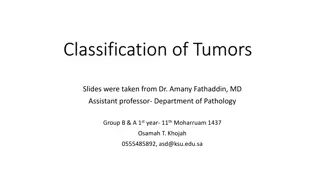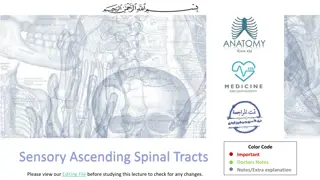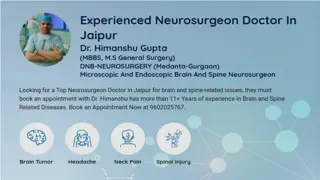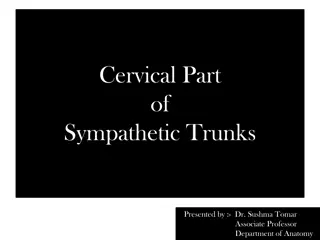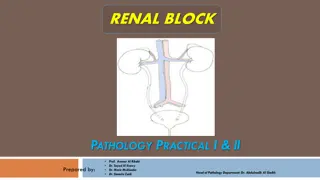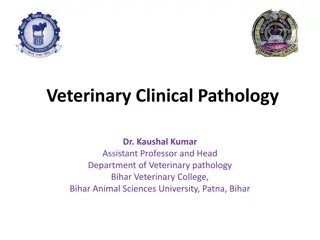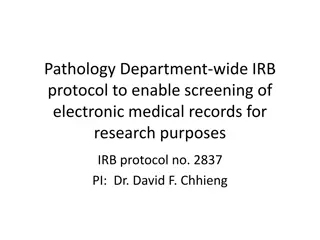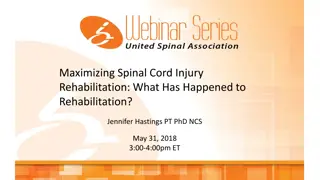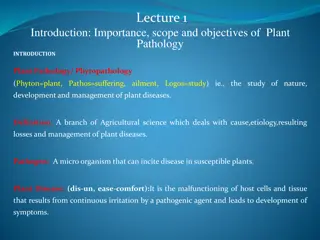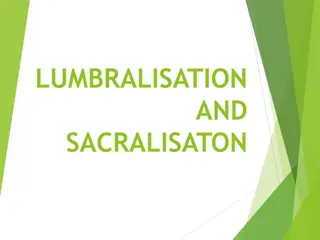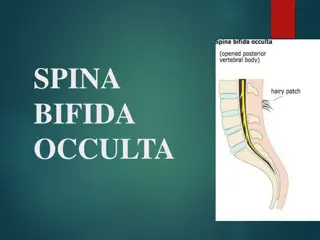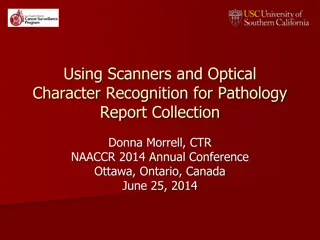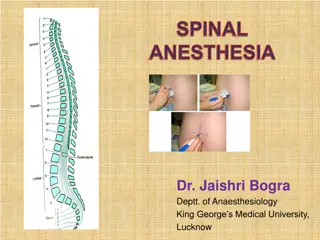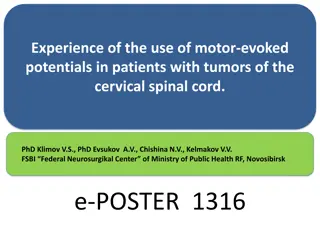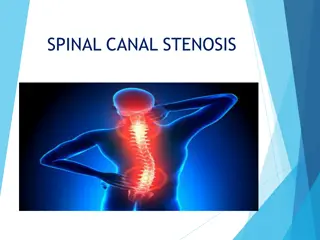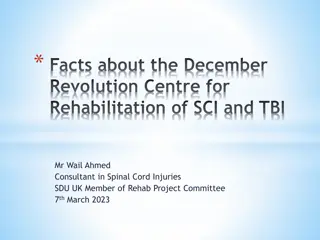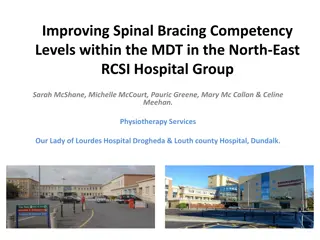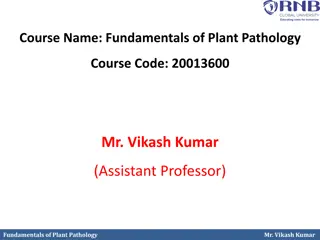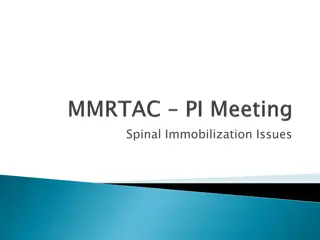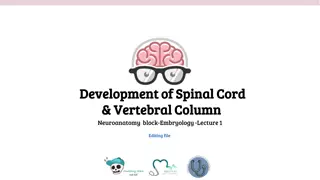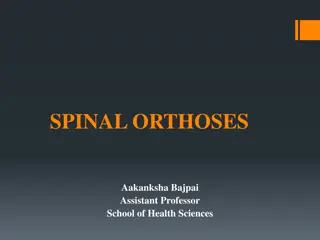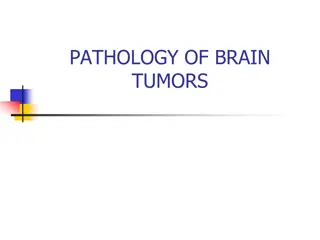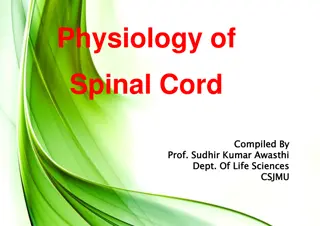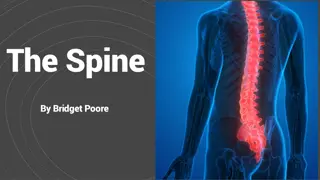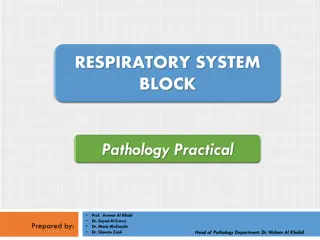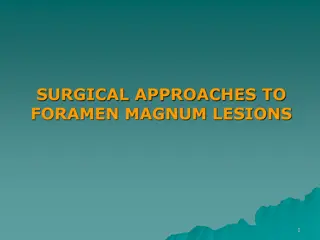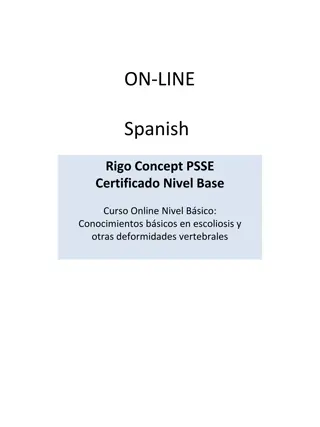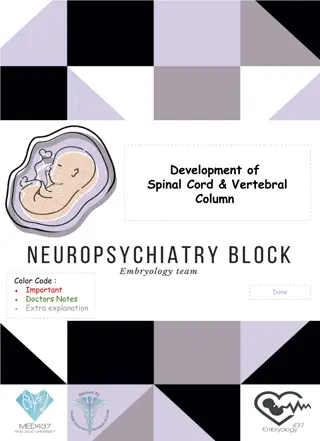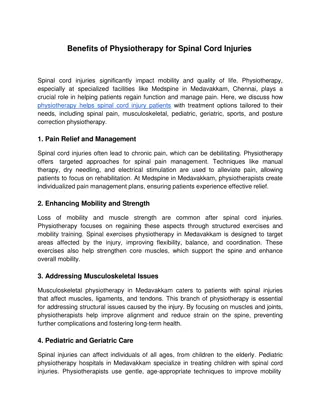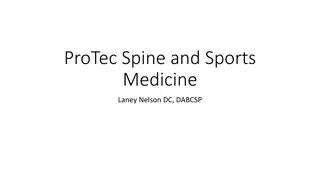Spinal injuries
An overview of spinal injuries, including anatomy revision, types of spinal fractures, assessment, management, and common patterns of injuries. It also covers back pain presentation, red flags, differentials, and the structure of vertebrae. The Denis classification of spinal fractures and the most c
3 views • 40 slides
Next - Gen Digital Pathology Conference | New Technology and Advancements
We at MarketsandMarkets are extremely thrilled to announce our \u201cMarketsandMarkets 2nd Annual Next-Gen Digital Pathology Conference\u201d scheduled to be held on 21st \u2013 22nd March 2024.\n\nRegister Now @ https:\/\/events.marketsandmarkets.com\/next-gen-digital-pathology-conference\/register
2 views • 5 slides
Understanding Tumor Classification and Nomenclature in Pathology
This slideshow provides an overview of tumor classification, nomenclature, and key concepts in pathology. It covers the definitions of neoplasm, tumor, and oncology, the classification of tumors into benign and malignant categories, as well as the importance of stroma in tumor behavior. It also expl
4 views • 61 slides
Medspine_ Your Destination for Premier Spine Surgery Solutions in Chennai
Medspine: Your Destination for Premier Spine Surgery Solutions in Chennai\n\nIn the bustling healthcare landscape of Chennai, finding the optimal care for spinal issues can be daunting. However, nestled within the city's medical hub lies Medspine, a beacon of excellence in spine surgery and treatmen
0 views • 2 slides
Medspine_ Your Destination for Premier Spine Surgery Solutions in Chennai(27_03_2024)
Medspine: Your Destination for Premier Spine Surgery Solutions in Chennai\n\nIn the bustling healthcare landscape of Chennai, finding the optimal care for spinal issues can be daunting. However, nestled within the city's medical hub lies Medspine, a beacon of excellence in spine surgery and treatmen
1 views • 2 slides
Sensory Ascending Spinal Tracts
Learn about sensory ascending spinal tracts, their classification, functions, and pathways. Explore how information is carried to the brain at conscious and subconscious levels through different types of sensations. Gain insights into the organization of white matter tracts and their importance in s
4 views • 22 slides
_Best Neurosurgeon Doctor In Jaipur || Dr Himanshu Gupta || drhimanshugupta.com
Dr. Himanshu Gupta is known not only for his mastery of surgical techniques, particularly in microsurgery and Endosurgery for brain tumors but also for his exceptional skills in managing patients requiring trauma, brain, and spine surgeries.\n\nHis focus lies in exclusive neurosurgery, making him a
0 views • 7 slides
Understanding the Cervical Part of Sympathetic Trunks
The sympathetic trunks play a crucial role in the human body, with the cervical part located in front of the transverse processes of cervical vertebrae and the neck of the 1st rib. This part presents three ganglia - superior, middle, and inferior. Sometimes, the inferior cervical and first thoracic
0 views • 25 slides
Renal Block Pathology Practical: Anatomy and Histology Overview
The Renal Block Pathology Practical provides a comprehensive insight into the anatomy, structure, and histology of the kidney nephrons, including normal and abnormal conditions such as acute kidney injury. The session covers topics like the structure of the nephron, normal kidney gross anatomy, rena
3 views • 47 slides
Post-Sophomore Fellowship Program in Pathology and Scholarly Pursuit at University of Pennsylvania Medical Center
Student Fellowship Program in Pathology at University of Pennsylvania Medical Center offers a unique work-study experience for students interested in pursuing a career in pathology. The year-long program includes rotations in Anatomic and/or Clinical Pathology, a dedicated research project, and tail
2 views • 4 slides
Overview of Veterinary Clinical Pathology and Importance of Anticoagulants
Veterinary clinical pathology involves the laboratory diagnostics and analysis of bodily fluids and tissues to support the diagnosis, treatment, and prevention of diseases. This field encompasses interpreting blood tests, blood smear examinations, and the use of various anticoagulants in specimen co
3 views • 46 slides
Pathology Department IRB Protocol for Electronic Medical Records Screening
Pathology Department's IRB protocol enables the screening of electronic medical records for research purposes, allowing members to review patient records and pathology slides. By fulfilling specific requirements and obtaining blanket IRB approval, researchers can access and analyze patient data for
0 views • 16 slides
Maximizing Spinal Cord Injury Rehabilitation: Insights and Advocacy Efforts
Explore the journey of spinal cord injury rehabilitation, challenges faced, and advocacy efforts by organizations like United Spinal Association. The impact of sudden onset spinal cord injuries on various aspects of life is highlighted, along with the importance of support and legislative advocacy.
1 views • 27 slides
Understanding Special Stains in Pathology
Special stains in pathology provide crucial diagnostic information beyond routine stains like H&E. They help highlight specific tissue components like carbohydrates, amyloid, nucleic acids, lipids, microorganisms, connective tissues, pigments, and minerals. This article delves into the classificatio
0 views • 19 slides
Understanding Plant Pathology: Importance, Scope, and Objectives
Plant pathology, also known as phytopathology, is the study of plant diseases and their management. It covers the causes, symptoms, and impact of pathogenic organisms on plants. The field aims to understand the interactions between plants and pathogens, develop control methods, and reduce losses in
0 views • 6 slides
Understanding Lumbarisation and Sacralisation in Human Spine
The human spine comprises the cervical, thoracic, lumbar, sacral, and coccyx vertebrae. Lumbarisation refers to the non-fusion of the uppermost sacral segment, while sacralisation involves fusion of the fifth lumbar vertebra with the sacrum. Lumbarisation can cause issues such as back pain, inflamma
0 views • 14 slides
Understanding Spina Bifida Occulta: Symptoms, Causes, and Treatment
Spina Bifida Occulta is a common neural tube defect, usually mild and hidden. It affects the lumbosacral area, characterized by vertebral arches not fusing, resulting in spinal processes defects without external protrusion. Common features include dimples, hairy patches, and normal spinal cord. Neur
0 views • 10 slides
Using Scanners and OCR for Pathology Report Collection
Los Angeles Cancer Surveillance Program has achieved 100% pathology report collection through a new approach involving scanners and Optical Character Recognition (OCR). The program aims to improve efficiency in obtaining and processing paper pathology reports, replacing insecure transportation and s
0 views • 29 slides
An Overview of Spinal Anesthesia in Regional Anesthesia Practice
Regional anesthesia, specifically spinal anesthesia, is a valuable technique involving the application of local anesthetic around a nerve to reduce or prevent impulse transmission. This method offers numerous advantages, such as cost-effectiveness, respiratory support, and post-operative pain relief
0 views • 46 slides
Use of Motor-Evoked Potentials in Cervical Spinal Cord Tumor Patients
Neurophysiological intraoperative monitoring using motor-evoked potentials is crucial in evaluating spinal cord function during surgery for cervical spinal cord tumors. This study examines the relationship between neurological changes and intraoperative motor-evoked potentials in patients, aiming to
0 views • 8 slides
Understanding Spinal Canal Stenosis: Causes, Symptoms, and Classification
Spinal canal stenosis is the abnormal narrowing of the spinal canal or intervertebral foramina, leading to compression of nerves and blood vessels. It can result in symptoms such as radiculopathy, claudication, myelopathy, and more. Cervical stenosis presents with arm pain and weakness, while lumbar
0 views • 18 slides
Development of a Tertiary Neurological Rehabilitation Centre in Sudan
The December Revolution Centre for Rehabilitation of Traumatic Spinal Cord and Brain Injuries at Khartoum Teaching Hospital addresses the lack of holistic patient-centered rehabilitation services in Sudan. Following the December 2018 Revolution, the need for specialized care for victims with spinal
0 views • 11 slides
Transforming Spinal Pathology Care: Belgian Registry Startup Journey
Experience the journey of establishing a national registry for spinal pathologies in Belgium, led by Johan G. Van Lerbeirghe. Explore the goals, history, and the significance of choosing Spine Tango as the registry platform. Witness the challenges, partnerships, and milestones in the Belgian Pilot p
0 views • 14 slides
Enhancing Spinal Bracing Competency in Healthcare Settings
This quality improvement project aimed to elevate spinal bracing competency among healthcare staff in the North-East RCSI Hospital Group. By focusing on training and upskilling physiotherapy, nursing, and healthcare assistant staff, the project successfully increased knowledge and understanding of s
0 views • 4 slides
Evolution of Plant Pathology: From Ancient Remedies to Modern Discoveries
Uncover the rich history of plant pathology, from ancient practices in Vraksha Ayurveda to modern breakthroughs by scientists like Anton de Bary and Alexander Fleming. Explore the development of mycology, key discoveries in disease management, and the impact of plant pathogens on historical events l
0 views • 16 slides
Spinal Immobilization in Trauma: Case Study and Considerations
A 70-year-old male with trauma after falling 20 feet was managed at the ED, demonstrating tenderness in the mid thoracic spine and other injuries. Despite negative cervical spine imaging, the patient underwent interventions for spinal fractures. The decision to transfer without a backboard highlight
0 views • 34 slides
Embryology of Spinal Cord and Vertebral Column Development
Explore the fascinating embryological journey of the spinal cord and vertebral column development, covering topics such as neural tube formation, layers of the spinal cord, subdivisions of mantle and marginal zones, chondrification, ossification stages, spina bifida types, and more. Dive into the st
1 views • 15 slides
Understanding Spinal Orthoses: Types, Uses, and Benefits
Spinal orthoses are back braces used to treat spinal disorders and injuries. They provide support, limit movement, and aid in healing. Orthoses are prescribed to realign the spine, immobilize it, limit mobility, and support weakened areas. Various types of orthoses are available based on the segment
0 views • 38 slides
Epidemiology and Pathology of Brain Tumors - Overview and Incidence Statistics
This information provides an in-depth overview of the epidemiology, classification, and pathology of brain tumors. It covers the relative incidence of various brain tumors, including astrocytoma, glioblastoma, meningioma, and others. The data also includes statistics on the occurrence of brain tumor
0 views • 98 slides
Understanding the Physiology of the Spinal Cord
The spinal cord serves as the information highway between the brain and body, allowing for sensory input reception and motor signal transmission. It plays a crucial role in locomotion, reflex responses, and overall coordination of muscle activities. The cylinder of nerve tissue within the vertebral
0 views • 18 slides
Understanding Joint Disabilities and Ankylosis in Spinal Health
Factors contributing to joint disabilities in spinal health include limited or excessive movement, muscle weakness, and fatigue. Painful motion, muscle spasm, and joint alignment issues can indicate disability. Ankylosis, seen in conditions like ankylosing spondylitis, results in joint fusion and im
0 views • 19 slides
Understanding Tuberculosis and Lung Cancer in Respiratory Pathology at KSU
Explore the detailed pathology of Tuberculosis (TB) and Lung Cancer through images and descriptions prepared by experts at the Pathology Department of King Saud University (KSU). Discover the features of TB such as epithelioid and giant cell granulomas, Ghon's complex, caseous necrosis, miliary TB,
0 views • 52 slides
Surgical Approaches to Foramen Magnum Lesions: Anatomy and Considerations
Surgical approaches to foramen magnum lesions involve understanding the anatomical structures, diameters, condyles, and contents of the region. Critical considerations include the choice of surgical approach based on the location and extent of the lesion, size, and nature of the pathology. Approache
0 views • 53 slides
Certification in Rigo Concept PSSE for Scoliosis and Spinal Deformities
This online course offers a base level certification in Rigo Concept PSSE, focusing on essential knowledge of scoliosis and other spinal deformities. Led by renowned professionals in the field, successful completion of the course allows access to further levels of certification for specific physical
0 views • 12 slides
Development of Spinal Cord and Vertebral Column - Doctors' Notes
The development of the spinal cord from the neural tube, layers of the spinal cord, subdivisions of mantle and marginal zones, meningeal layers, vertebral column development, chondrification, ossification stages, spina bifida types, and positional changes of the spinal cord are crucial aspects cover
0 views • 10 slides
Benefits of Physiotherapy for Spinal Cord Injuries
Physiotherapy is an extreely important part of treatment for spinal problems. Multiple physiotherapy modalities are useful in relieving spinal pain. Personalisedexercise programs are tailored to each patient\u2019s Specific Problems.
0 views • 2 slides
Understanding the Role of Multifidus Muscle in Spinal Health
Exploring the multifaceted role of the multifidus muscle in lumbar spine stability and control through histochemical studies and clinical comparisons. Insights into muscle changes with spinal conditions and the importance of maintaining its integrity for overall spinal health are discussed.
0 views • 26 slides
Canine Distemper in Wild Animals - Pathology and Disease Overview
Canine distemper virus (CDV) poses a significant threat to various carnivore species, including domestic dogs, foxes, wolves, raccoons, bears, and others. This highly contagious disease has been linked to fatalities in lions and emphasizes the importance of understanding its pathology and impact on
0 views • 10 slides
United Spinal Association: Empowering People with Disabilities
The United Spinal Association is dedicated to enhancing the quality of life for wheelchair users and the broader disability community. With over 75 years of commitment, they empower individuals with spinal cord injuries and disorders to achieve the highest possible quality of life through advocacy,
0 views • 7 slides
United Spinal Association: Empowering Individuals with Disabilities
United Spinal Association is dedicated to enhancing the quality of life for wheelchair users and individuals with spinal cord injuries and disorders. With over 75 years of experience, they provide support, advocacy, and resources to empower people with disabilities to achieve their fullest potential
0 views • 7 slides


